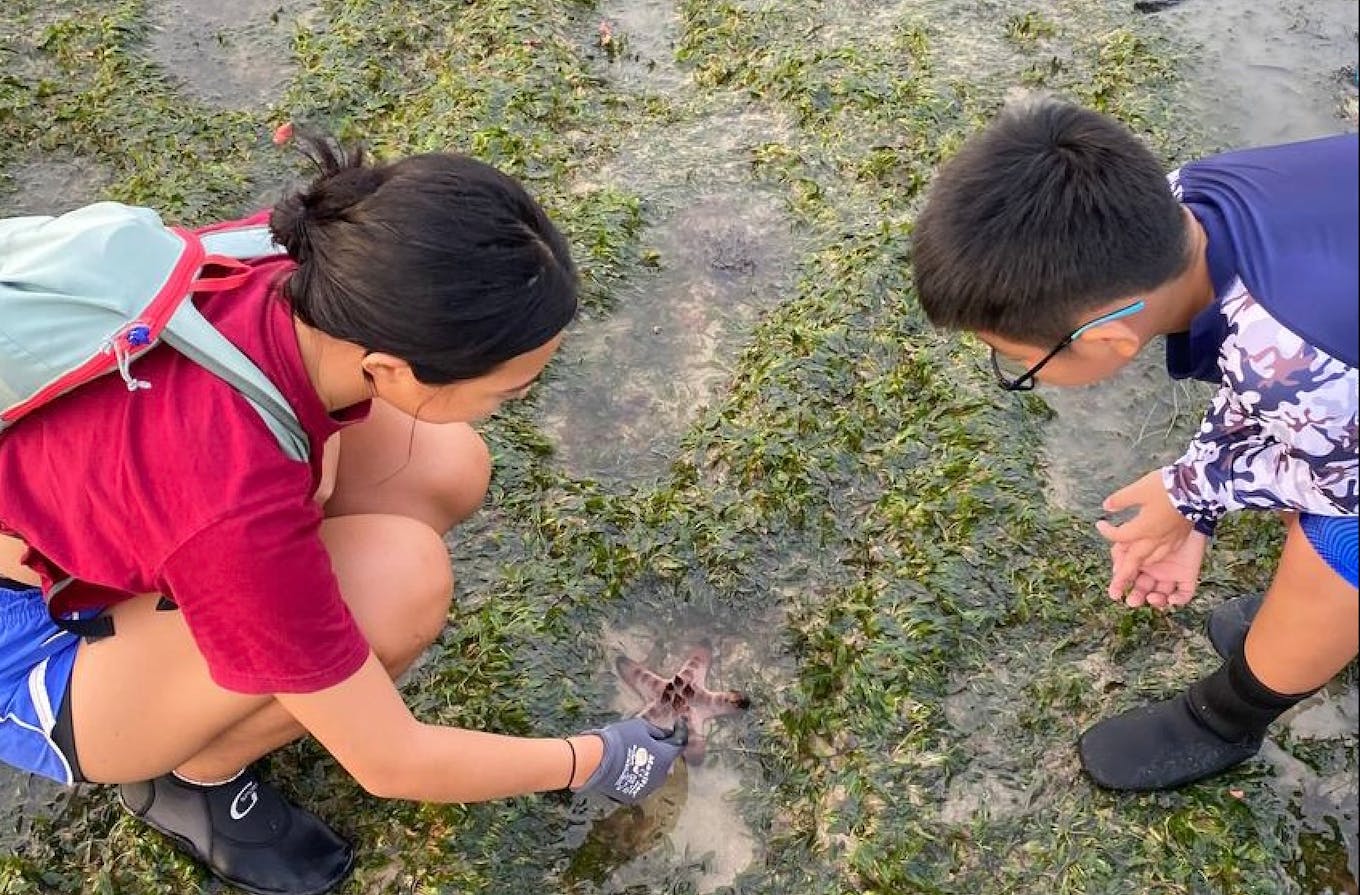When she was much younger, Cassandra Yip-Lee didn’t feel like a career as an environmentalist was accessible, even though her parents were nature lovers. They met while scuba diving, were knowledgeable about marine life, and childhood trips to the beach had given Yip-Lee the opportunity to be close to the sun and the sea.
To continue reading, subscribe to Eco‑Business.
There's something for everyone. We offer a range of subscription plans.
- Access our stories and receive our Insights Weekly newsletter with the free EB Member plan.
- Unlock unlimited access to our content and archive with EB Circle.
- Publish your content with EB Premium.
Yip-Lee says that she later realised that it was probably how mainstream education in Singapore shaped her views about career possibilities. “Growing up here, I never had many opportunities to learn about our natural environment. For a long time, I had the impression that I would have to leave Singapore in order to pursue my dream of being an environmentalist.”
Yip-Lee, a final-year environmental studies undergraduate at the National University of Singapore, is now the founder and chief executive officer of Earth School Singapore, the city-state’s first nonprofit school for environmental education. The two-year venture, which provides a platform for young children to connect with nature, has run into its fair share of problems and challenges since inception, but Yip-Lee shares that having a diverse and resilient team has helped.
A key milestone for Earth School Singapore in 2022 was when it piloted a comprehensive 10-week environmental sustainability education programme to be implemented in primary schools across Singapore. The Student Heroes in Environmental Leadership Development (SHIELD) programme includes lessons on biodiversity and clean energy, and also features homegrown green organisations and local environmentalists.
In conjunction with the launch of the third edition of The Sustainability Exchange, a youth mentorship programme aimed at accelerating the understanding of sustainability issues among young people, Yip-Lee speaks to Eco-Business about how young people can apply their ideas to real-world business and policy contexts.

Earth School Singapore’s outdoor curriculum provides young children with a chance to encounter nature. Image: Cassandra Yip-Lee
Tell us more about Earth School Singapore.
The idea of Earth School first came about in 2020 during the Covid-19 lockdown. It became a reality about a year later in 2021. We have been operating, developing, and growing ever since. We are a youth-run non-profit organisation that aims to promote environmental conservation through making quality, science-based environmental education accessible and affordable to children and youths in Singapore. We are a team of 10 undergraduates, each with a different area of expertise in environmental sustainability ranging from botany to circularity.
Why environmental education, and why children?
Growing up in Singapore, I never had many opportunities in school to learn about our natural environment. For a long time, I had the impression that I would have to leave Singapore in order to pursue my dream of being an environmentalist.
Earth School is an avenue for me to show young boys and girls that even in our “little red dot” [a common description of Singapore], there are whole ecosystems and an abundance of biodiversity to celebrate, and to conserve. By providing opportunities for children to experience and learn about nature, we hope to inspire and nurture future scientists, engineers, artists and many more who all care for the environment in their own ways.
What’s part of the curriculum at Earth School? How different is it from other educational models?
Earth School’s curriculum is based on 10 of the main environmental-related United Nations’ Sustainable Development Goals. We run both indoors and outdoor lessons. Our indoor curriculum involves bringing nature to students with in-classroom lessons that simulate aspects of our natural environment. On the other hand, our outdoor curriculum is centred around creating immersive experiences for students to explore nature in a safe and responsible manner.
Our guiding principle in curating and developing our lessons is: “How can we impart scientific environmental knowledge to our students in ways that are easily understandable, and also make them feel connected to nature?”
We value creativity and fun in our work, and that translates directly into our lessons making them engaging and thought provoking for our students. I believe that’s what sets us apart.
Why do you think mainstream education institutions are not fulfilling these needs of educating the young about sustainability?
The focus of education in Singapore has always been on technical, tangible and objective skills like Mathematics and English. I don’t believe that mainstream education institutions purposely refuse to adopt sustainability education, but rather it is that their teachers have no experience or expertise in this field, and no capacity to create additional teaching material. Neither have resources been committed to this.
However, I believe that, very soon, more educational institutions will begin to realise the need to prepare their students for the future where green jobs and green skills will be in-demand and where they need to establish an environmental education curriculum. This is where Earth School hopes to come in and support their efforts by offering access to our existing materials and lesson plans.
What can be done to improve the learning ecosystem?
Just like art, music, physical education, social studies etc., I do think there is a place in our education system to include environmental studies. While I do want to see the subject become [part of] a formal curriculum, I do recognise this will take time.
I think that there is an opportunity to start incorporating environmental knowledge into everyday education now. This can be as simple as applying fundamental concepts towards environmental themes, such as having English comprehension pieces be on deforestation, or Physics classes on how solar panels create energy.
What do the children you encounter at Earth School sessions think about key environment issues?
Many of our students have surprised us with how much baseline knowledge of the environment they have, or their ability to draw connections between today’s issues and the sustainability of Singapore’s future. With every lesson, we always get a lot of students asking us a lot of questions, which really shows how curious they are about our natural world.
What were some of the challenges you encountered while starting a nonprofit, especially since you are still in school?
Some people, particularly those from large profit-making companies, have an expectation that we will provide our services and materials to them for no cost. We are a nonprofit and whatever revenue we make goes into our overhead and manpower costs and the remainder goes to our conservation fund which funds regional conservation work such as coral-planting projects or elephant sanctuaries or our community fund which funds the cost of running programmes for children’s charities and underprivileged groups. As students, we already take time off from our university assignments when we need to curate a programme or do up a proposal bid. We hope that other corporations can be more understanding about how we cannot offer free resources to them.
People are often amazed by how much we have accomplished with Earth School, especially when we only work on it during after-school hours. I think it’s because we embody the saying: If you want to go fast, go alone. If you want to go far, go together. We have only come this far because we have such a great team of incredibly dedicated and capable individuals who have put in so much of their time and effort into building Earth School.
How does having a diverse team benefit your work?
Each of our individual expertise is representative of the intersectionality of environmentalism. As a result, Earth School’s curriculum covers a wide ground and explains the multi-dimensional nature of climate change and other environmental issues. Having a diverse team from various socio-cultural backgrounds also informs us on how to effectively contextualise environmental knowledge for Singapore’s multicultural and multireligious setting.
What I love best about my team is that everyone is so passionate and always has so many incredible ideas about how we go about achieving things. We challenge each other to always be better in the work we do.
The third edition of the ‘Sustainability Exchange’ is accepting applications now. Interested youths and mentors can apply here. Under the guidance of mentors, participants will solve a pre-curated list of problem statements that focus on Singapore’s transition to the green economy. There will be new capacity-building workshops, as well as community and alumni engagement sessions, offered this season.
The initiative is launched by EB Impact, the nonprofit sister organisation of Eco-Business, in partnership with Meta, OCBC Bank and SG Eco Fund. The deadline for applications is 10 April 2023.





















